Seven points on purchasing complete set of organic fertilizer equipment
You need consider the following seven points, before you decide to buy the complete set of organic fertilizer equipment.
- The capacity of fertilizer equipment
How many tons of your organic fertilizer equipment is produced per year. You’d better be accurate to how many tons per hour. That’s because some factories can run 365 days a year while some factories can produce 300 days a year. Some workshops can run the equipment 24 hours a day, while others only run 8 hours. In order to matching equipment more reasonable, it’s necessary to consider the capacity of the complete set of organic fertilizer equipment. Especially, the hourly output needs to be specifically determined. And the types of complete sets of equipment of normal organic fertilizer equipment manufacturers are divided into: 10,000, 20,000, 30,000, 40,000, 50,000 and 100,000 tons per year. After doing a good job of market research, you should determine the scale of fertilizer production you need, and determine the appropriate production scale based on market prospects and raw material supplied.
- The shape of pellet
There are different shapes of pellets, such as powder, column, oblate or standard round. And the common granulating equipment are disc granulator, rotary drum churning granulator, new type organic fertilizer granulator, double roller extrusion granulator, flat die granulator, rotary drum granulator. The selection of the granulator should be decided according to your local fertilizer sales market. It’s no doubt that the different equipment is not the same price.
- The configuration level of equipment
The configuration level determines the cost of the organic fertilizer equipment! It’s no doubt that the more advanced equipment will take more money. You should determine the configuration level of the equipment. That makes a decision on the equipment price and the amount of labor used.
- The type of organic fertilizer
Pure organic fertilizer, organic-inorganic compound fertilizer, biological organic fertilizer and compound microbial fertilizer are four general types of organic fertilizers. And there are a little differences in equipment to make them.
- The type of fermentation compost equipment
General forms of fermentation include pile fermentation, shallow groove fermentation, deep groove fermentation, tower-type fermentation and rotary drum fermentation. And different fermentation methods needs different fermentation equipment.
- The type of the main organic raw material
Common organic raw materials include chicken manure, pig manure, cow manure, sheep manure, straw, medicine residue, furfural residue, humic acid, pond mud, domestic sludge from municipal sewage treatment plants, etc. The selection of equipment is slightly different because of different raw materials.
Formulating a reasonable production process for raw materials is a prerequisite for purchasing a complete set of organic fertilizer equipment. The equipment manufacturer will design a production process chart according to the customer’s raw material and product requirements to determine what processes and equipment are needed in the entire production process.
- The planning of factory area
As large-scale equipment occupies more space, it is necessary to make a reasonable plan for the entire plant area. It’s vital to make a reasonable location layout and area allocation for the fermentation workshop, production workshop, and finished product workshop to make sure facilitate orderly production.
In actual production, the fermentation workshop occupies a large space, and the supply of raw materials must be guaranteed. If the production line is too large, raw materials cannot be supplied, which will easily cause equipment to be idle and waste of funds. If the line is too small, that will cause equipment to be exhausted and the supply cannot be guaranteed.

